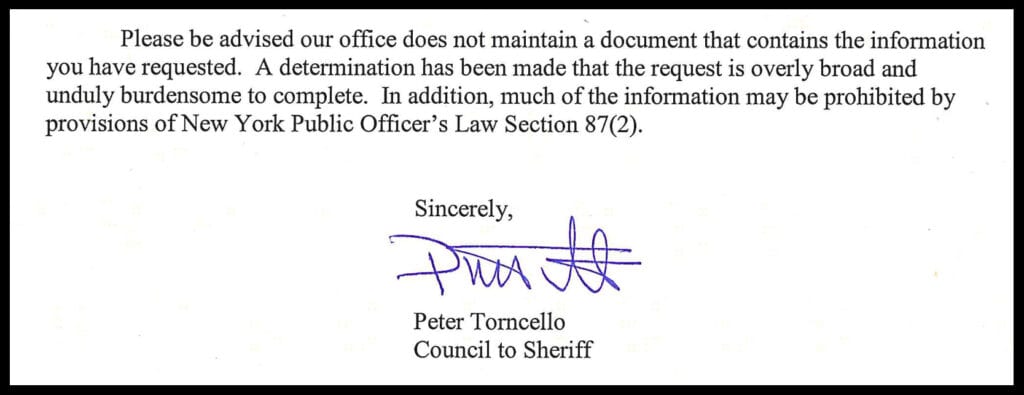During a quiet moment outside of the Albany Police Department’s South Station, as protesters were gathered for an occupation-style protest last Spring, a young police officer was debating with a Black Lives Matter activist.
The officer spoke about changes in the state’s Civil Rights Law — specifically Section 50-a, claiming it was a step in the right direction and something that should help ease accountability concerns.
“Anyone can see those records now,” he told the protester.
Actually seeing those records has been a different story.
On April 14, Albany Proper filed a request for Albany Police disciplinary records dating back to June 12, 2020. It made up less than one year’s time — one volatile year since the murder of George Floyd.
On that date, the New York state lawmakers repealed a subsection that had historically shielded disciplinary records, and the troubled officers behind them, from the public. Police departments across the state are now legally required to release disciplinary records to the public — theoretically.
266 days later, Marissa Shane, a detective in the Office of Professional Standards, formally denied the request:
“Each document is individual based. There is currently no way to extract the data electronically, but the Albany Police Department is currently working towards a solution for the future.”
At least one other news outlet received the same denial notice last week.
Article 6 of the New York State Public Officers Law, also known as the Freedom of Information Law (FOIL), allows members of the public and press to obtain public records from state and local government agencies. The New York Court of Appeals has repeatedly ruled that FOIL “expresses this State’s strong commitment to open government and public accountability and imposes a broad standard of disclosure upon the State and its agencies.”
Last year, the repeal of 50-a firmly placed police disciplinary records within the scope of public disclosure through FOIL. It was part of a progressive reform package that was widely celebrated at the time.
Since then, some police unions have gone to the highest levels of state court to challenge the legality of the law. Albany Proper’s request purposefully did not include retroactive records from before the law changed, something that is being hashed out in the courts.
Meanwhile, Albany’s own Police Reform and Re-imagining Task Force included a working group dedicated to reforming APD’s General Orders – reforms which includes posting disciplinary records online.
Require APD to update this General Order to include disclosure of Personnel records following the repeal of Civil Rights Law 50-a. To promote transparency APD should post online information about disciplinary actions taken against officers that would be subject to disclosure under FOIL.
Records Administration: G.O. 4.2.00-I.B.7 –Freedom of Information Law (FOIL)
Other cities across the state have released their disciplinary records. In an “effort to maintain transparency”, the city of Utica built a website to disclose the records of all of their officers. The city of Rochester has done the same, creating a database specifically in response to the repeal of 50-a.
Despite the mayor’s office repeatedly claiming that Albany has the best reform plan in the state — the release of disciplinary records, already set forth in a state law that supersedes any local general orders, does not appear to be a priority in that rollout.
The mayor’s office has since hired Matt Toporowski, a trial attorney who ran against District Attorney David Soares last year, to “focus on police accountability and assist with policing reform implementation.” Among his responsibilities is overseeing the rewriting of General Orders.
Police unions are expected to legally challenge those changes. It could take years for them to be implemented — if at all.
The New York State Law Enforcement Officers Union previously filed a lawsuit against Local Law J, which would give the Community Police Review Board more authority over misconduct investigations and discipline going forward. After citizens passed that law, the police union is now attempting to move that case from Albany County Court to the New York State Public Employment Relations Board, which has ruled favorably in past disputes involving their collective bargaining agreement – rulings that were later overturned by the Court of Appeals.
In response, Toporowski wrote in a court filing that it was an attempt to “kick the can down the road to a more favorable forum for them.”
Melanie Trimble, Capital Region Chapter Director for the New York Civil Liberties Union, believes that the law is clear. Her organization is currently in court with the cities of Troy and Saratoga Springs over their failure to produce FOIL records.
“There’s a lot of confusion and a lot of different interpretations between the departments,” she said of the repeal of 50-a. “We hope to clear that up and make sure that we see departments turning over disciplinary records in a way that will be helpful to the public to determine whether their departments need assistance in correcting any problems that they’re having with police officers.”
Last year, the NYCLU launched a Police Misconduct Transparency Campaign. Since then, Trimble found that “the recording, retrieval and offering of departments varies dramatically from one end of the state to the other.” Albany was not one of the 10 departments that the organization sought records as part of their state-wide campaign.

Albany County appeared to be confused over the law, too. An Albany Proper request for similar disciplinary records from the Albany County Sheriff’s Office was initially denied, with Council to Sheriff Peter Torncello classifying the request as “unduly burdensome to complete”.
Torncello broadly claimed that the department does not maintain such a document. However, according to the Albany County Sheriff’s own reform plan, “the county endorses a system of progressive discipline to address deviations from policy which can range from formal reprimands to termination in accordance with policy, collective bargaining agreements, and the totality of circumstances related to the specific incident.”
After Albany Proper appealed the denial and won, the Sheriff’s department provided the records that they had claimed to not maintain.
In the ruling, Albany County Legislator Victoria Plotsky called the Sheriff’s denial “unpersuasive.”
Albany Proper is now appealing the Albany Police Department’s denial.
- Patrick Porter remembered as a creative force – June 30, 2025
- Protomartyr and Fashion Club at No Fun – June 13, 2024
- Sheer Mag at No Fun – May 5, 2024

